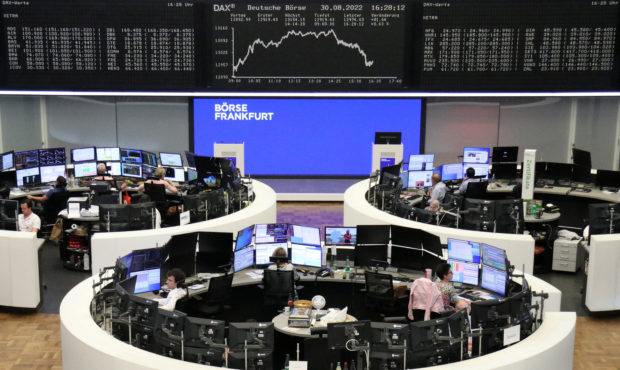
The German share price index DAX graph is pictured at the stock exchange in Frankfurt, Germany, August 30, 2022. REUTERS/Staff
European shares slipped on Wednesday as data showed euro zone inflation in August hit another record high, while energy concerns intensified after Russia began halting gas flows to Germany via a key supply route.
The continent-wide STOXX 600 fell 0.8 percent to new six-week lows after trading higher at the open, extending losses to a fourth straight day. Energy stocks led losses as oil prices continued to slide on recession fears.
The benchmark STOXX 600 index is on course for a monthly loss of 5 percent on fears of hawkish central bank policies and escalating risks of recession and energy rationing in the region.
Euro zone inflation rose to another record high of 9.1 percent this month from 8.9 percent a month earlier, beating expectations and staying well clear of the European Central Bank’s (ECB) 2 percent target. The euro zone stocks index fell 0.8 percent to hover near six-week lows.
“This is yet another eye-watering number, showing consumers were feeling the pain even before Russia tightened its grip on its energy market,” said Susannah Streeter, senior investment and markets analyst at Hargreaves Lansdown.
“But what’s particularly worrying is underlying inflation rose to 5.5 percent from 5.1 percent, adding to concerns that an inflationary spiral is becoming embedded.”
“These readings will add fuel to the fire of worries that ECB policymakers will implement a big hike in September, despite uncertainty ahead in terms of energy security.”
A Reuters report Friday said some ECB policymakers want to discuss a 75 bps rate hike next month, even if recession risks loom, as the inflation outlook deteriorates.
Adding to the recession concerns, Russia halted gas supplies via Europe’s key supply route Nord Stream 1, as the pipeline’s operator confirmed no gas was flowing on Wednesday morning. Among individual stocks, Italian bank UniCredit rose 2.9 percent after saying the ECB had authorized a second share buyback instalment worth up to 1 billion euros ($1 billion). Dormakaba Holding declined 3.4 percent after the Swiss security group forecast organic growth slightly above its target range, but added that the outlook applied only to the first half of the 2022/23 financial year due to rising macroeconomic challenges.
Italy’s Eni fell 4.1 percent after saying it would receive lower volumes of gas from Russia’s Gazprom.
In a sign that investors were bracing for a period of higher inflation and interest rates, German borrowing costs were set to end August with their biggest monthly surge in over 30 years.

